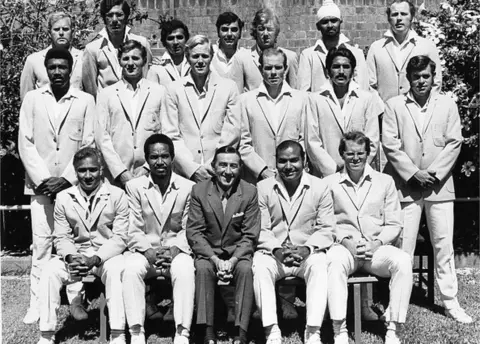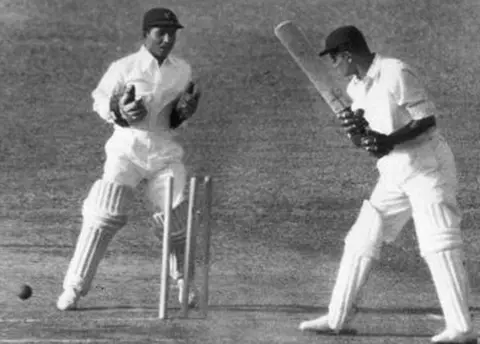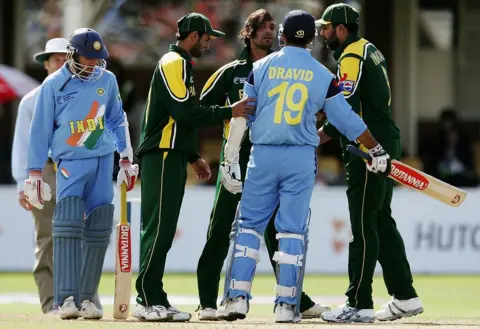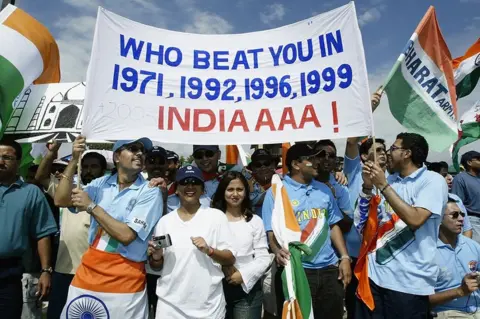India v Pakistan: When the neighbours played cricket during a war

 Getty Images
Getty ImagesIndia's participation in the Asia Cup next year is in doubt after a cricket board official ruled out the team travelling to Pakistan for the tournament. Pakistan says such a move could impact its visit to the 2023 ICC World Cup in India. On the eve of Sunday's game in the World T20 tournament, the BBC looks back at how the subcontinental rivals have mostly enjoyed a cordial relationship on field - even during a war.
Indian legend Sunil Gavaskar remembers the time when his teammates shared a dressing room with their Pakistani counterparts for nearly four months even as the South Asian neighbours fought a war in the subcontinent.
More than 7,000km away, in Australia, cricket stars from the subcontinent were part of a Rest of the World team which played more than half a dozen games against the hosts. The nine-month war ended in December 1971 with Bangladesh winning independence from Pakistan.
In his memoirs, Gavaskar, one of the greatest opening batsmen ever, wrote that there was "no tension at all between the Indians and Pakistani players despite what was happening".
Half a dozen players in the 17-member Gary Sobers-led Rest of the World team were from the subcontinent. Gavaskar, feisty spin legend Bishen Bedi and the swashbuckling wicketkeeper-batter Farokh Engineer were the Indians picked up for the squad. Pakistan was represented by the flamboyant batter Zaheer Abbas, virtuoso all-rounder Intikhab Alam and pace bowler Asif Masood.
 Getty Images
Getty Images"Almost every evening we went out for a meal to a restaurant owned by a Pakistani. The owner would hear reports from various radio news bulletins and write them down in Urdu on a paper napkin and give it to Intikhab. Inti would barely glance at it, crumple it up and throw it away," Gavaskar writes in Sunny Days, his 1976 book.
On field, fellow international cricketers gently ribbed about the subcontinental rivals. Hylton Ackerman, a South African who opened the batting with Gavaskar, "used the situation to imagine some really funny situations".
One of them was about Alam and Engineer "facing each other with bayonets, myself in a fighter plane, with Asif Masood on a my tail; and Bishen and Zaheer trying to run away".
"We had a good laugh," Gavaskar writes.
Off field, there were some worries.
Bedi was apparently unhappy with Engineer telling a local journalist that "because his house in Bombay (now Mumbai) faced the sea, he was afraid about the safety of his wife and daughters and that he was going to ask them to go home in Lancashire [where Engineer had a house]", Gavaskar writes. And the spinner, who did not talk to reporters, was "upset over the war because his hometown Amritsar was close to the Pakistan border".
 Getty Images
Getty ImagesGavaskar's memories about Indian and Pakistani players sharing a dressing room during the Bangladesh war shows how the fraught relationship between the nuclear-armed rivals - the two have fought two wars and a limited conflict over Kashmir - never really came in the way of relationships between their cricketers.
Pakistan played no international cricket for five years after the Partition of British India in 1947. It toured India in 1952 when the two sides played their first Test match. In A Corner of a Foreign Field, a sprawling history of Indian cricket, Ramachandra Guha recounted the tour to illustrate the complex and contradictory relationship of the game with the strained politics of two rivals.
The back page of Pakistan's Dawn newspaper, once owned by founder of Pakistan, Mohammed Ali Jinnah, hoped that the team would "leave a good impression...They are ambassadors of goodwill..." even as the front page had headlines like 'Bharat [India] Augments Her army In Occupied Kashmir".
By all accounts, the tour was a success. Efforts by a fringe radical Hindu group to whip up public support for a boycott of the Test in Calcutta (now Kolkata) failed miserably as huge crowds turned up to watch the game. India won the five-Test series 2-1.
India and Pakistan have played only 58 Test matches over the last 70 years. India and Australia have played 97 Test matches in the same period.
Many of the early bilateral series between India and Pakistan were insipid affairs, ending in draws, including one in India in 1960-61. As the ties worsened - wars in 1965 and 1971 - the two sides did not play each other for 17 years until a diplomatic thaw allowed them to resume cricketing ties in 1978 with India visiting Pakistan.
 Getty Images
Getty ImagesThe two sides played each other for the next two decades before politics again disrupted ties. This time India refused to play, accusing its neighbour of stoking the bloody insurgency in Kashmir region, an allegation Pakistan denied. A major diplomatic initiative after the conflict in Kargil led the Indian team travelling to Pakistan in 2003-2004.
The next four years saw yearly tours until the bloody November 2008 Mumbai terror attacks stopped bilateral tours. The only exception was when Pakistan toured India for a five game white-ball series in 2012-213, which it won 3-2. Pakistanis continue to be excluded from the Indian Premier League, the world's richest cricket tournament. "It is hard to find a parallel for this fraught on-off relationship within the world of cricket," wrote Mukul Kesavan, an Indian historian, in an essay.
Sports writer Suresh Menon says the India-Pakistan rivalry has generally been more intense in the hearts and minds of supporters than the players.
Indian players have always spoken about the love and admiration they have received from fans in Pakistan. In 1955, thousands of fans gathered at the Karachi airport to greet Indian cricketers. Whenever Indian players went shopping during Pakistan tours, shops would often refuse to take money from them.
Menon says these days social media battles are fought by fans who "believe that a win on a cricket field is conclusive proof that one political system or one religion or one nation is superior to the other". One of sport's biggest games and an unique rivalry continues to remain hostage to the tumultuous politics of the subcontinent.
